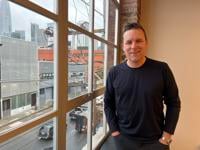You might not believe it from all the talk in recent years about a “doom loop” and an “exodus,” but San Francisco’s startup scene is arguably thriving.
Venture investment in San Francisco startups is holding up even amid a sharp nationwide downturn, and those startups’ share of the national pie of venture dollars has risen to its highest level in seven years. The City has become the global epicenter for the burgeoning artificial-intelligence industry, with a disproportionate share of the top firms and funding. And companies, founders, workers and investors are starting to make their way back to San Francisco — to the extent they ever left.
“I would say it’s the most exciting startup ecosystem in the U.S.,” said Pete Flint, a general partner at NFX, a venture firm based in The City. The most ambitious and technologically serious founders — ”the most committed founders,” as he put it — “are finding their way back here.”
Part of the draw: being a part of what Carson called “the emerging hub of AI.”
Unlike Carson, Tomas Puig never left. After founding Alembic in San Francisco in 2018, he’s been steadily building his company here. Its staff has grown from two to 22 over that period; of those, 18 work in San Francisco.
Earlier this year, the startup — which has developed an artificial-intelligence-powered system for analyzing the effectiveness of marketing messages — announced it had raised $14 million in a Series A round. Puig said he plans to use the new funds to double or even triple Alembic’s San Francisco staff.
He cited multiple reasons for sticking with San Francisco. The City is his home, and he and his team have had success building companies here before. Raising the funding he needed to launch Alembic was easy and quick; he just called up people he knew in the area. And the tech talent is here.
“The City has been very good to us,” Puig said. “The culture of innovation and ecosystems — that’s here.”
Indeed, for all of San Francisco’s myriad challenges, The City retains much of what made it the epicenter of the tech industry in the first place, experts say. It’s a desirable place to live. The Bay Area remains the center of the venture-capital industry. Nearby Stanford and UC Berkeley continue to churn out highly skilled engineers and programmers. And it has a highly developed and proven ecosystem for building startups into major public companies or significant acquisition targets.
Still, San Francisco’s global reputation as the epicenter of innovation has suffered greatly in recent years.
Its share of venture funding began shrinking years before the COVID-19 pandemic, as investors started focusing on startups in cities and regions aiming to be the next Silicon Valley. Prominent venture capitalists decamped for other locations, convinced there were better opportunities with less red tape and progressive pushback elsewhere.
During the pandemic, companies big and small embraced remote work and distributed teams, and in some cases shut their San Francisco headquarters. Given that freedom, tech workers and executives moved out of The City, heading to the suburbs, Tahoe or beyond, looking for cheaper housing, lower taxes or a seemingly better quality of life.
Some inside and outside The City started to worry San Francisco was destined to be a new Detroit, stuck in a so-called doom loop in which its most affluent citizens and companies would flee what they saw as a failed city.
It turns out those fears were a little, shall we say, overblown.
Venture investment peaked in San Francisco and nationwide in 2021 as the Federal Reserve flooded the economy with money to help the nation recover from the COVID shutdowns. The following year, when the Fed turned off the spigot, venture investment plunged locally and nationally. Across the U.S., it fell another 31% last year from 2022, according to PitchBook, an industry research firm.
Reilly Brennan of Trucks VC says San Francisco remains attractive to founders.
Troy Wolverton
In San Francisco, venture funding fell last year also — but not nearly as much, dropping by 11% to $28.7 billion, according to updated numbers from PitchBook. That was The City’s third-highest tally ever and significantly above what it recorded in 2020, which at the time was a record amount. Although venture funding in San Francisco dropped 48% on a year-over-year basis in the first quarter, that was largely due to just two big deals warping the numbers.
Last year, more than one in every six dollars invested in startups nationwide went to ones based in San Francisco — that’s The City proper, not the metropolitan region or entire Bay Area, according to PitchBook. That was the highest level The City’s share had been since 2016. In the first quarter, despite the funding drop, San Francisco’s share was even higher, topping 20%.
Driving that resurgence was AI. In 2023, San Francisco-based startups focused on technologies such as generative AI, machine learning, computer vision and autonomous vehicles raised $17.8 million, or about 33% of all the dollars invested in AI startups nationwide, according to PitchBook. City-based AI startups raised another $5.5 billion in the first quarter — 49% of the nationwide total.
What’s more, four of the 10 biggest funding rounds across the nation were raised by San Francisco companies, including the biggest of them all — the $10 billion round raised by OpenAI. One of the other four — a $2 billion deal — was raised by Anthropic, OpenAI’s city-based rival. Anthropic last month closed another $4 billion investment from Amazon.
While other companies may still question the need for San Francisco office space, AI businesses are moving in the opposite direction. Such companies see a need to be in the office and are leasing up space to accommodate their growing workforces, company executives and real estate analysts say.

San Francisco will get a slight reprieve from the blistering fall heat later this week before temperatures rise again over the weekend

There are lessons to be learned — and some to be ignored — from poll results so far

Tamara de Lempicka also subject of de Young museum’s first-in-U.S. retrospective of her art
Last year, AI companies collectively leased more than 1 million square feet of space in The City, growing their footprint by more than a third, according to data from Jones Lang LaSalle and CBRE. They leased nearly another 100,000 square feet in San Francisco in the first quarter and are in the market for 800,000 more, according to JLL. By 2030, JLL expects such companies to be leasing 12.7 million square feet of space in The City, or nearly 15% of San Francisco’s current total office space.
Having employees work in person helps AI companies assess their models and fix errors more quickly, and it fosters brainstorming and collaboration, said Puig, whose company is based on Townsend Street near the Caltrain station.
“We still have not found a really good replacement for trying to bang out stuff on a whiteboard,” he said.
As a partner at Lightspeed Venture Partners, Sydney Sykes focuses on early-stage startups. During the height of the COVID-19 pandemic, she said, many companies she was talking to weren’t based in the area.
But since then she’s seen a slow return of companies and founders to San Francisco, she said. These days, many more companies she’s talking to are based in The City or surrounding areas. She chalks much of that up to the excitement around AI.
AI “has created a lot of energy around San Francisco,” she said.
But the resurgence of The City’s startup scene extends beyond just AI companies. The other two San Francisco companies whose funding rounds ranked in the top 10 nationwide last year — Commure and Generate Capital — are a health-care software developer and an investor in green energy projects.
San Francisco venture firm Trucks VC’s two most recent investments are based in The City. Bidirectional Energy has developed a way of allowing electric vehicles to power homes during blackouts and when energy prices are high. Verne is working on a way to compress hydrogen so it can be used to power large vehicles such as big-rig trucks and large ships that could prove difficult to electrify.
The City used to be the default place in the United States to locate a startup, Trucks partner Reilly Brennan said. That’s less true today than before the pandemic, but it remains plenty attractive to founders, he said.
“It’s still unlike every other city due to the density of people, capital and ideas,” Brennan said.
Indeed, San Francisco retains some huge advantages over its rivals around the country, Brennan and other venture experts said. The bulk of the nation’s venture firms are based in the Bay Area, and those that aren’t generally have offices here.
While venture investors widely turned to video conferencing to meet with founders during the height of the pandemic, many have gone back to in-person meetings. That’s given locally based startups something of a home-field advantage, venture experts say. It’s much easier for investors and founders who are both based here to get together, whether it’s because a founder is looking to raise new funds or seeking advance from an existing investor.
When it comes to offering founders a chance to meet with a wide range of venture capitalists all in one place, “San Francisco is unrivaled,” said Kyle Stanford, an analyst with PitchBook.
Some venture firms and investors are encouraging startups — either subtly or overtly — to relocate to San Francisco or the Bay Area to be closer to their backers. Techstars, which runs an accelerator program, recently announced it was shutting down its programs in Seattle and Boulder, Colo., to focus on those in areas that have “the most robust venture capital communities” — most notably San Francisco, GeekWire reported last month.
NFX’s Flint said he’s in agreement with such efforts. Building a successful startup is hard, and locating in or near San Francisco and those investors “is going to give the team the best chance of success,” he said.
But there are other reasons why San Francisco is still attractive to founders and entrepreneurs. Many of the world’s biggest and most successful tech companies — including Salesforce, Uber, Airbnb, Apple, Google and Meta — are based in The City or the wider region. Thanks to those companies and others in the area, the region has a wealth of talented engineers and programmers who often serve as the crucial building blocks of new startups.
It’s basically impossible to find that concentration of talent anywhere else. Of all the people in the U.S. who have AI-related skills, 20% are based in the Bay Area, according to a study by JLL.
Not only do people here have the technical skills startups need, but many also have crucial business expertise. They know how to build successful startups because they’ve done it before. Until San Francisco’s would-be rivals start showing that they too can build startups that go public or sell for billions of dollars, startups in those areas are going to continue to look like a much riskier bet, particularly now when funding’s tight, Stanford said.
And for all San Francisco’s problems with homelessness, property crime and the like, it remains a beautiful city with temperate weather, great restaurants, and thriving arts and entertainment scenes.
“I’m not worried that San Francisco is losing its tech dominance at all,” said Molly Turner, a lecturer at UC Berkeley’s Haas School of Business who focuses on tech and cities. “It’s still a wonderful city where people want to live.”
Copyright for syndicated content belongs to the linked Source link






